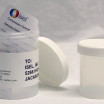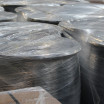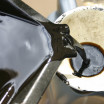Knowledge Base Articles
Avoid Oil Sampling Pitfalls

Oil analysis is a valuable tool for determining the condition of lubricating oil and the equipment it lubricates. It is best used as a trending process — not a...
Water Hazard: Protect Lubricants And Equipment From Water Contamination

Water is one of the most destructive contaminants in lubrication. It is capable of causing significant damage to the lubricant itself and to the equipment in which the lubricant...
Q: What Factors Can Affect The Shelf Life Of A Lubricant In Storage?

A: Extreme heat or cold, fluctuating temperatures, moisture/humidity, dust and dirt can shorten the life span of stored lubricants. For this reason, it is prudent to: Purchase lubricants in...
The Benefits Of Oil Analysis

Routine oil analysis is an effective way of gauging the condition of a lubricant and determining optimum change intervals — to get the most life out of the oil...
Q: How Does Compressor Operating Temperature Affect Lubricant Life?

A: Increases in operating temperature and/or environmental temperature accelerate the pace of oxidation, the chemical reaction between a lubricant and oxygen that “ages” the lubricant and diminishes its service...
Avoid These Lubrication Mistakes

The best way to determine the correct frequency of oil changes is to eliminate the guesswork and turn to regular oil analysis. What causes machinery to lose useful life?...
Q: What Is The Difference Between The Food-Grade Lubricant Classifications H1, H2 And H3?

A: These classifications distinguish different types of food-grade lubricants by what they may/may not contain and how they may be used. H1 lubricants may be used in applications where...
Lubricant Storage And Handling: It Matters More Than You Think

If you want to improve the performance and service life of your lubricants, take a look at your storage and handling procedures. Often treated as an afterthought, storage and...
Q: How Frequently Should Used Oil Be Changed?

A: That factor depends not only on the oil itself, but also the application and operating conditions. A lubricant’s service life can be affected by many factors, such as...
Isel Meets Your Lubricant Needs With Unmatched Speed

Speed is essential for virtually any competitive business. It matters to your customers, and it matters to you. That is why Isel is committed to offering industry-leading turnaround time...
